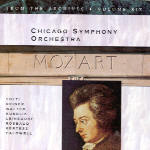This special edition made by the Chicago Symphony Orchestra in collaboration with WFMT radio gathers together live recordings from 1950 to 1985, including two vocal selections from the Ravinia Festival. They all give a fair example of the affinity existing between the Chicago Symphony and Mozart. The orchestra’s nervous virtuosity and compact yet flexible sound can make a perfect instrument for music of the classical period. Unfortunately, not everything is successful in this strangely selected collection. The Serenade for Wind Instruments K. 361, recorded in 1985, sounds earthbound and prosaic under Erich Leinsdorf, with playing that is often unbalanced and even inaccurate. On the other hand, the “Finale” from the Horn Concerto K. 447, recorded in 1950, has plenty of excitement and good humor thanks to the excellent Philip Farkas and Rafael Kubelik, but it suffers from limited sound, disfigured by distortion and narrow dynamic range. While Rita Streich sings the aria “Non so più cosa son, cosa faccio” from The Marriage of Figaro with wonderful freshness and wit, it’s odd to hear the “Catalog Aria” from Don Giovanni sung in English–no matter how cleverly and effectively Donald Gramm achieves the task.
The three symphonies and the overture to The Magic Flute are more satisfying. Conductor Hans Rosbaud kept two main interests during his professional career: contemporary music and Mozart. He takes the Magic Flute overture at a brisk tempo that gives the music boldness and momentum. Bruno Walter’s approach to Symphony No. 28 sounds more traditional but not less pleasant; its over-legato articulation and supple rhythms underline the lyric qualities of this youthful work. The contrast couldn’t be more acute than with Fritz Reiner’s rendition of the “Paris” Symphony. Under his powerful baton, it becomes a grandiose construction, fast-paced and dramatically contrasted, almost on the verge of dryness. Finally, in Sir Georg Solti the “Jupiter” Symphony finds not just an ardent advocate but a precise and capable translator. The performance sounds beautiful–but it’s also terribly sluggish in places and certainly would have benefited from Reiner’s excess of energy. As you might expect, the sound overall is inconsistent but generally good, with the exception noted above.
































